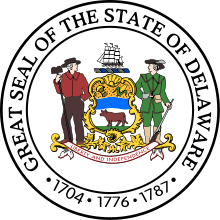Politics of Delaware
Due to the state's small size (45th of 50 by population in 2006), the politics of Delaware tend to be less convoluted and controversial than those in neighboring states. Nonetheless, Delaware's political status quo reflects the state's long history of political clout dating from the earliest days of the United States, some of which remains today.
| Year | Democratic | Republican |
|---|---|---|
| 1952 | 47.9% 81,772 | 52.1% 88,977 |
| 1956 | 48.1% 85,047 | 52.0% 91,965 |
| 1960 | 51.7% 100,792 | 48.3% 94,043 |
| 1964 | 51.4% 102,797 | 48.7% 97,374 |
| 1968 | 49.5% 102,360 | 50.5% 104,474 |
| 1972 | 51.3% 117,274 | 47.9% 109,583 |
| 1976 | 42.5% 97,480 | 56.9% 130,531 |
| 1980 | 28.5% 64,217 | 70.7% 159,004 |
| 1984 | 44.5% 108,315 | 55.5% 135,250 |
| 1988 | 29.3% 70,236 | 70.7% 169,733 |
| 1992 | 64.7% 179,365 | 32.8% 90,725 |
| 1996 | 69.5% 188,300 | 30.5% 82,564 |
| 2000 | 59.2% 191,695 | 39.8% 128,603 |
| 2004 | 50.9% 185,548 | 45.8% 167,008 |
| 2008 | 67.5% 266,861 | 32.0% 126,662 |
| 2012 | 69.3% 275,993 | 28.6% 113,793 |
| 2016 | 58.3% 248,404 | 39.2% 166,852 |
| Year | Democratic | Republican |
|---|---|---|
| 1952 | 47.9% 83,315 | 51.8% 90,059 |
| 1956 | 44.6% 79,421 | 55.1% 98,057 |
| 1960 | 50.6% 99,590 | 49.0% 96,373 |
| 1964 | 61.0% 122,704 | 38.8% 78,078 |
| 1968 | 41.6% 89,194 | 45.1% 96,714 |
| 1972 | 39.2% 92,283 | 59.6% 140,357 |
| 1976 | 52.0% 122,596 | 46.6% 109,831 |
| 1980 | 44.9% 105,754 | 47.2% 111,252 |
| 1984 | 39.9% 101,656 | 59.8% 152,190 |
| 1988 | 43.5% 108,647 | 55.9% 139,639 |
| 1992 | 43.5% 126,054 | 35.3% 102,313 |
| 1996 | 51.8% 140,355 | 36.6% 99,062 |
| 2000 | 55.0% 180,068 | 41.9% 137,288 |
| 2004 | 53.4% 200,152 | 45.8% 171,660 |
| 2008 | 61.9% 255,459 | 36.9% 152,374 |
| 2012 | 58.6% 242,584 | 40.0% 165,484 |
| 2016 | 53.1% 235,603 | 41.7% 185,127 |
Major issues
Delaware residents as a group tend to vote toward the conservative side of moderate on fiscal and economic issues, and are more moderate on social issues. Social liberalism is generally concentrated in the northern part of the state, and conservatism is more prevalent in the less heavily populated central and southern regions. Some of the wealthiest neighborhoods around Wilmington (in the north) as well as a few of the more progressive beach towns (in the south) serve as exceptions to this general trend. Politicians of both major parties tend to vote consistently in favor of big business, a very important sector of Delaware's economy.
Matters of perennial statewide debate tend to include taxation (which runs relatively low compared to other northeastern states); the needs and demands of Delaware's massive business community; education (Delaware's educational spending per student remains low); increasing stress on the environment; urban development and sprawl; the needs of an increasingly diverse population; large income disparities between wealthy and disadvantaged areas; and a perceived disconnect between the rural central and southern areas of the state and Wilmington and the urbanized corridor in the north, home to the bulk of the state's population.
National office holders
Delaware's situation with respect to the Presidential Primary Election changed between 2000 and 2008.[2] Delaware's Primary is held "on the first Tuesday in February in the calendar year of a presidential election."[3] In 2000, Delaware was the sole state to have a primary on February 1, while in 2004 it was one of five states with primaries on February 3.[2] In the 2008 primaries, Delaware shared February 5 with 23 other states on "Super Tuesday (2008)", the largest group of simultaneous primary races in the history of the United States.[2][4] Being the first Primary in the nation increases the influence of a state disproportionately in determining who the contestants will be in the general presidential election. However, as other states change the dates of their primaries, influence is inevitably decreased.[2]
Delaware's senators in the United States Senate are Chris Coons and Tom Carper, both Democrats. Delaware's sole representative in the United States House of Representatives is Lisa Blunt Rochester, a Democrat.
Statewide office holders
The current governor of Delaware is John C. Carney Jr., a Democrat currently serving his first term.
Delaware's Attorney General is Kathy Jennings.
See also
References
- Leip, David. "General Election Results – Delaware". Dave Leip's Atlas of U.S. Presidential Elections. Retrieved August 4, 2018.
- Beth Miller (January 13, 2008). "Dela-where? Campaigns bypass First State". The News Journal. Retrieved January 13, 2008.
...it did have an early Republican primary all to itself in 2000, when it provided George W. Bush with his first primary win. In 2004, Delaware shared its primary day with four other states. And now, it is shoehorned into a virtual phone booth.
- "Presidential Primary Election". Online Delaware Code. State of Delaware. January 1, 2008. Retrieved January 13, 2008.
...a presidential primary election for major political parties shall be conducted on the first Tuesday in February in the calendar year of a presidential election.
- Richard Allen Greene (May 30, 2007). "States jostle for primary power". Washington: BBC News. Retrieved January 13, 2008.
The US has had "Super Tuesdays" in the past ... (b)ut it has never seen anything like what is shaping up for February 5, 2008 – which some wits are calling "Super Duper Tuesday".
